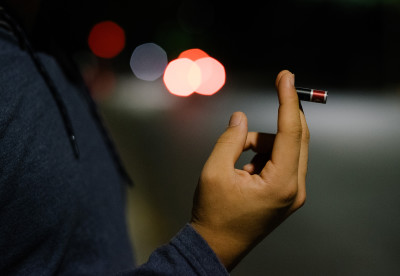
A regulation that will ban Massachusetts minors from purchasing electronic cigarettes will go into effect starting Sept. 25 as a result of efforts from Massachusetts Attorney General Maura Healey and public health officials.
The final piece of regulations filed on Sep. 11 with the Massachusetts Secretary of State’s office will prohibit those under the age of 18 from purchasing any product that delivers nicotine through inhalation, according to the regulation document.
Sandro Galea, dean of the School of Public Health at Boston University, said banning the use of any smoking product is necessary to prevent future addiction.
“There is plenty of evidence that suggests that delaying the age at which cigarettes are accessible results in less smoking later in life and better health,” he said.
Use of any tobacco products can have adverse health effects, Galea said.
“E-cigarettes are less harmful than combustible cigarettes,” he said. “Having said that, there is harm with e-cigarettes and with that in mind, delaying the start of e-cigarette use has a greater chance of maintaining health.”
Other regulations include limiting e-cigarette purchases to “face-to-face exchanges” only and requiring them to be out of reach for customers in stores, according to a Monday press release from Healey’s office.
Regulation of electronic smoking devices is fairly new, the document stated, and must be handled carefully.
Jillian Fennimore, a spokesperson for Healey, said the new amended regulation will help create a sense of consistency for the minimum sales age of 18 to purchase e-cigarettes across the Commonwealth.
E-cigarette use has surpassed traditional cigarette use by young people, Fennimore wrote in an email, and research shows that nicotine, the active ingredient in both tobacco and most e-cigarette vapor, is both harmful and addictive to the brain and body.
Several residents shared varying opinions about implementing electronic cigarette regulation.
Donald Sequeira, 58, of West Roxbury, said he does not believe the ban would be a good measure to stop teens from smoking.
“I haven’t heard about it, but I think it’s a good idea,” he said. “But will it stop [minors] from getting it? I don’t think so.”
Sequeira said it is too soon to determine whether the use of e-cigarettes as a substitute is good or not.
Jarrod Brophy, 45, of Brighton, said he sees the ban as more of a move to tax e-cigarettes.
“I’ve listened to [Healey] speak about a bunch of issues, and I don’t always agree with them, but I understand where they’re coming from,” he said. “They just want to tax it.”
Brophy has used e-cigarettes, and said that there are good aspects to substituting them for regular cigarettes, but that the health risks are still unknown.
“As far as the health risks go, it hasn’t been around long enough to determine if there are any long-term effects, but it wouldn’t surprise me if there were,” he said. “Who’s to say? It’s kind of premature to really make a determination.”
Michelle Flores, 45, of the South End, said the ban is necessary for public health.
“It’s shocking to me how many people smoke, particularly young people, [and] that someone younger than me thinks it’s okay to smoke given all the health issues that are confirmed and undeniable,” she said.
Mary Ricardo, 18, a student at Emerson College, said that the ban probably would not make a huge difference.
“Regardless of the ban, there will still be people who buy [and use] e-cigarettes,” she said. “[But] it’s really not good to get addicted to things when you’re that young. When you turn 18, I feel like you’re at a point where you can make that decision for yourself.”
CORRECTION: A previous version of this article called the ban on electronic cigarettes a law instead of a regulation. The article has been updated to reflect this change.




















































































































